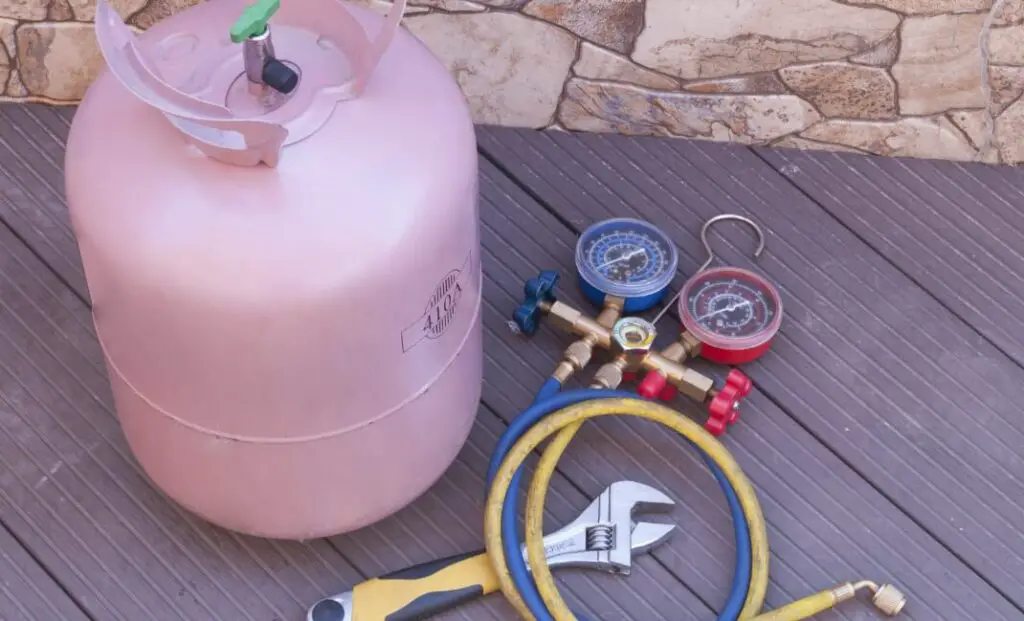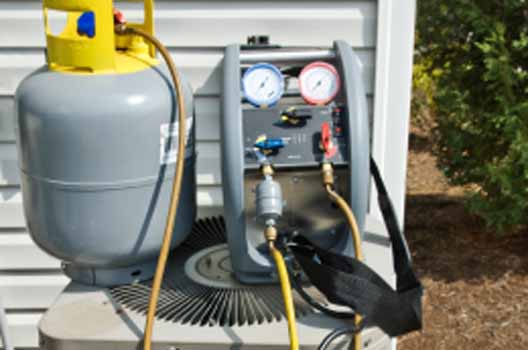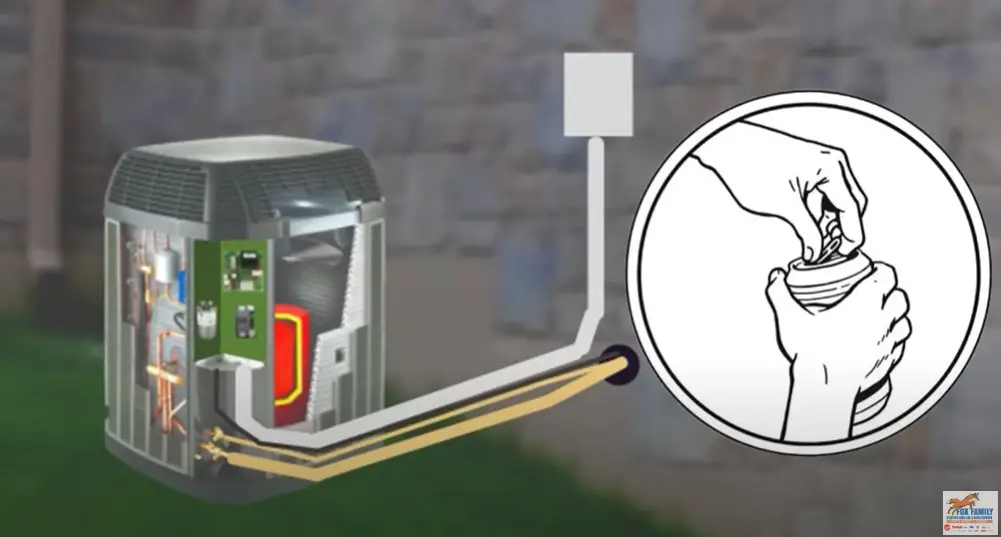Yes, air conditioners commonly use a refrigerant called Freon, although the specific type of refrigerant used can vary depending on the age and type of the air conditioner.
Freon is a brand name for a group of chlorofluorocarbon (CFC) or hydrochlorofluorocarbon (HCFC) refrigerants that were widely used in the past for their cooling properties. However, due to environmental concerns regarding their ozone-depleting and global warming potential, the use of CFCs has been phased out globally.
Modern air conditioners typically use hydrofluorocarbon (HFC) refrigerants, which do not contain chlorine and have a lower impact on the ozone layer. HFC refrigerants, such as R-410A or R-32, are now the most common refrigerants used in residential and commercial air conditioning systems.
It’s important to note that while “Freon” is often used as a generic term for refrigerants, it specifically refers to a group of CFC or HCFC refrigerants and should not be used interchangeably with the term “refrigerant.”

What is Freon AC?
Freon is a trade name for a family of haloalkane refrigerants manufactured by DuPont and other companies. Freon-12 was the first CFC (chlorofluorocarbon) refrigerant, developed in 1930 by Thomas Midgley, Jr., working for General Motors. Freon-12 was used extensively in air conditioning systems until 1995 when it was banned worldwide due to its high global warming potential.
Freon is still used in some applications, such as refrigeration and aerosol cans. When released into the atmosphere, Freon breaks down quickly and does not linger like many other greenhouse gases.
However, this does not mean that it isn’t damaging to the ozone layer – every bit counts when it comes to protecting our planet!
If you have an older air conditioner or fridge that uses Freon, make sure to get it serviced by a professional who can safely remove the gas. You can also look into alternatives to Freoning your home or office – there are many more environmentally friendly options available now than there were even just a few years ago.
Do Air Conditioners Use Freon? Exploring the Truth
As the summer heat approaches, many homeowners may be wondering if their air conditioners use Freon.
The truth is, while older models of air conditioners did use Freon, newer models use a different refrigerant.
Freon, also known as R-22, has been phased out due to its harmful effects on the environment. The replacement refrigerant, R-410A, is more eco-friendly and efficient.
That being said, if you have an older air conditioning unit, it is important to have it serviced by a professional who can properly handle and dispose of any remaining Freon.
It is also important to properly maintain your air conditioner, regardless of the refrigerant used, to ensure its optimal performance.
What are the Pros and Cons of Freon as a Refrigerant?
Freon has been used for decades as a refrigerant in air conditioning and refrigeration systems. While it has proven to be effective in many applications, there are both pros and cons to its use.
Pros Of Freon As a Refrigerant:
Some of the advantages of Freon as a refrigerant include:
- It is a stable and reliable refrigerant that can be used in a variety of applications.
- It is non-toxic and non-flammable, making it a safer option than some other refrigerants.
- It has a relatively low boiling point, which makes it effective at cooling and refrigeration.
Cons Of Freon As a Refrigerant:
However, there are also some drawbacks to using Freon:
- It is known to contribute to ozone depletion and global warming.
- It is being phased out in many countries due to environmental concerns.
- It can be expensive and difficult to dispose of properly.
Overall, while Freon has been a popular refrigerant in the past, currently the production and use have been phased out in many countries due to environmental concerns.
Do Window Air Conditioners Use Freon?
While most people know that window air conditioners use Freon, they may not know exactly how it works. Freon is a chlorofluorocarbon gas that is used as a refrigerant in air conditioners. When the Freon is compressed, it evaporates and absorbs heat from the air inside the unit.
The cooled air is then circulated back into the room. Window air conditioners are one of the most common types of AC units, and they are also one of the most efficient. That’s because they don’t require ductwork, so there’s no loss of cool air through leaks.
Additionally, window AC units are less expensive to operate than central AC systems because they use less energy.
How to Check the Freon in a Home Air Conditioner?
If your home air conditioner isn’t cooling properly, one possible reason is that it may be low on Freon. Freon is the refrigerant used in air conditioners, and it’s what helps to cool the air inside your home. Checking the Freon level in your air conditioner is a fairly simple task that you can do yourself, and it only takes a few minutes.
To check the Freon level in your air conditioner:
1. Locate the outdoor unit of your air conditioner. This is usually located on the side or back of your house.
2. Find the service valve on the outdoor unit. The service valve looks like a small black knob or lever, and it’s usually located near the bottom of the unit.
3. Place a rag over the service valve to catch any drips from when you open it up. Then, use a wrench to turn counterclockwise until you feel resistance – this indicates that you’ve opened up the valve fully. You should now see a stream of Freon coming out from under the rag into a container below (make sure not to let any Freon escape into the atmosphere). If there’s no Freon coming out, then this means that your air conditioner is completely empty and will need to be recharged by a professional technician before it will work again properly.
On average, an AC recharge costs about $100-$200 depending on how much Freon is needed and where you live geographically.
In some cases, however, if there are leaks in other parts of the system this can be much more expensive so checking for leaks should always be done first. Recharging with too much Freon can also cause damage so it’s important to get help from a qualified person if needed.
4. Once finished collecting the sample close off the valve by turning it clockwise till snug using a wrench.
5. Label clearly the date collected, location (inside or outside), and name (if multiple units) so as not to confuse results later.
6. Take the sample to the nearest HVAC contractor for analysis most will do this for free. Some might charge a nominal fee but given the importance of having a proper charge, it’s worth the expense
7. They will identify whether the system needs more Freon or not based on pressure readings from a testing device called a manifold.
Symptoms of Low Freon in Central Air Conditioners
If your central air conditioner is low on Freon, you may notice some or all of these symptoms:
1. The air coming from the vents is not as cold as it used to be.
2. The air conditioner runs for longer periods of time but does not cool the house down as much as it used to.
3. You may hear a hissing sound coming from the outdoor unit when the compressor is running. This sound is caused by escaping Freon and indicates a serious problem that needs to be addressed immediately.
4. Your energy bills may be higher than usual due to the air conditioner working harder than normal to try and cool your home.
If you suspect that your central air conditioner is low on Freon, it’s important to have it checked out by a qualified technician right away before any further damage occurs.
How to check if your central air is low on freon?
If your central air is low on freon, there are a few things you can do to check and see. One is to check the temperature of the air coming out of the vents. If it is lower than usual, then your air is low on freon.
Another way to tell is by listening to the compressor. If it is making a hissing sound, then it is most likely low on freon. And finally, you can check the pressure of the system using a pressure gauge.
If the pressure is low, then your system is low on freon.
How often do air conditioners need freon?
The frequency at which air conditioners need to be recharged with freon, or refrigerant, can vary depending on several factors. In a properly functioning and well-maintained air conditioning system, the refrigerant should not need to be recharged regularly. Air conditioners are designed to operate with a fixed amount of refrigerant, and under normal circumstances, there should be no significant loss or depletion of refrigerant.
If an air conditioner is losing refrigerant, it indicates a problem such as a leak in the system. Leaks can be caused by various factors, including wear and tear, manufacturing defects, or improper installation. When a leak occurs, the refrigerant gradually escapes, leading to reduced cooling efficiency and potential damage to the compressor.
If you find that your air conditioner requires frequent recharging of refrigerant, it is crucial to have a qualified HVAC professional inspect the system to identify and fix any leaks. Simply adding more refrigerant without addressing the underlying issue is not a permanent solution and can lead to increased energy consumption and costly repairs. Regular maintenance and timely repairs can help ensure your air conditioner operates efficiently and maintains the proper level of refrigerant.
How Often Do AC Need Freon?
Your air conditioner is one of the most hardworking appliances in your home. It runs day and night during the hottest months of the year to keep your family cool and comfortable. But like all appliances, it needs a little TLC from time to time to keep it running efficiently.
One of the most important maintenance tasks for your AC is to keep it properly charged with Freon. Freon is the refrigerant that helps your AC remove heat and moisture from the air. Over time, Freon can leak out of your AC system, causing it to lose its cooling power.
So how often does your AC need Freon? It depends on several factors, including the age and condition of your AC unit, the type of Freon it uses, and the climate you live in.
In general, most AC units need to be recharged with Freon every 2-3 years. If you live in an area with a hot, humid climate, your AC unit may need to be recharged more often. And if your AC unit is older or isn’t operating as efficiently as it used to, it may also need to be recharged more often.
If you’re not sure how often your AC unit needs to be recharged with Freon, the best thing to do is to contact a professional AC technician.

How often do mini-splits need freon?
As with any mechanical device that uses refrigerant, mini splits will eventually need more freon. The frequency with which they need it will depend on several factors, including the climate in which they’re used, the size of the unit, and how often it’s used.
In general, though, most mini-splits will need additional freon every one to three years. If you live in an area with a lot of extreme weather, you may need to recharge your unit more often. Conversely, if you live in a milder climate and don’t use your mini-split very often, you may be able to go longer between recharges.
If you’re not sure how often your mini-split needs freon, the best thing to do is to have it serviced by a qualified technician every year or two. They’ll be able to check the level of refrigerant and recharge the unit if necessary.
Do portable air conditioners use freon?
Does AC need coolant?
If your car has an air conditioner, it probably uses Freon™ refrigerant. Freon is a trading name for a group of chemicals called chlorofluorocarbons (CFCs). CFCs were once used as propellants in aerosol cans and as refrigerants, but their production and use have been phased out because they damage the Earth’s ozone layer.
While Freon is no longer used in new cars, it can still be found in older vehicles. If your car’s air conditioner uses Freon, it will need to be refilled from time to time. Over time, Freon can leak out of the system through small cracks and holes.
If too much Freon is lost, the air conditioner will no longer work properly. If you think your car’s air conditioner is low on Freon, take it to a qualified mechanic for a diagnosis. They will be able to tell you for sure if the system needs to be refilled and, if so, how much Freon it will need.
How can I Add Freon to My Air Conditioner? The Steps
Adding freon to your air conditioner may seem like a daunting task, but with the right tools and knowledge, it can be done easily.
- First, turn off the power to your air conditioning unit.
- Locate the service valves on your unit, which are typically found on the larger of the two copper tubes running from your AC unit.
- Attach a refrigerant gauge to the service valve, and connect a can of freon to the gauge.
- Slowly open the valve on the freon can and allow it to flow into the AC unit until the gauge reads the correct pressure.
- Keep in mind that adding too much freon can damage your unit, so it’s important to only add the recommended amount.
- Finally, turn your AC unit back on and check for proper cooling.

FAQs for Do Air Conditioners Use Freon
Frequently Asked Questions (FAQs) for Do air conditioners use Freon will be an important resource for individuals looking to understand the use of Freon in air conditioning systems, as it is a potentially harmful substance that has been phased out of production due to its negative impact on the environment.
These FAQs provide detailed information regarding the use of Freon in AC systems, including its potential health hazards, the timeline for phasing it out, and the alternatives available for those looking to switch to more environmentally-friendly options.
How Do I Know If My Air Conditioner Needs Freon?
Your air conditioner needs Freon if it is not cooling your home as efficiently as it used to. You may also notice that your air conditioner is making strange noises or smells. If you suspect that your air conditioner needs Freon, call a qualified technician to check it out.
Do All Air Conditioners Require Freon?
The short answer is no, not all air conditioners require Freon. In fact, the vast majority of air conditioners on the market today do not use Freon. Freon is a trade name for a group of chemicals called chlorofluorocarbons (CFCs), which are used as refrigerants.
CFCs were once ubiquitous in air conditioners, but their production was phased out in the 1990s due to their harmful effect on the Earth’s ozone layer. The Montreal Protocol, an international treaty signed in 1987, mandated the phase-out of CFC production. As a result of the Montreal Protocol, manufacturers began searching for alternatives to CFCs.
The most common refrigerant used in air conditioners today is called HFC-134a, or R-134a. HFC-134a does not contain chlorine and therefore does not damage the ozone layer. There are a few older models of air conditioners that still use Freon, but these units are becoming increasingly rare and will eventually be phased out completely.
If you have an older model AC unit that uses Freon, you may need to have it serviced by a certified technician who can recharge it with a new refrigerant.
How Often Should My Ac Need Freon?

Air conditioners should not need freon added to them very often. In fact, if your air conditioner needs freon added more than once every few years, there may be a problem with the unit. Some common reasons why an air conditioner might need freon added include:
- Leaks: If there is a leak in the refrigerant lines, the freon will slowly leak out of the system. This can happen due to wear and tear, or if the unit is not properly maintained.
- Low refrigerant levels: If the refrigerant levels in the unit are too low, the air conditioner will not be able to cool properly. This can happen due to a leak, or if the refrigerant has been used up over time.
- Clogged filters: Clogged filters can restrict airflow, which can make it difficult for the air conditioner to cool properly. This can lead to a decrease in refrigerant levels.
- Dirty coils: Dirty coils can also reduce the efficiency of the air conditioner, which can lead to a decrease in refrigerant levels.
Conclusion
Yes, air conditioners use Freon. Freon is a gas that is used as a refrigerant in air conditioners. It helps to cool the air in the room by absorbing heat from the air and then releasing it outside.